Статьи журнала - Новый исторический вестник
Все статьи: 990

Democracy in modern scientific and political discourse: the experience and legacy of Ancient Rome
Статья научная
This article studies the phenomenon of democracy as part of the discussion on the nature of the political system of the Roman Republic in the 3rd - 1st centuries BC, generated by the works of the British researcher Fergus Millar. The authors of the article believe that the key mistake of the opponents in this discussion is that they take Athenian democracy as the criterion. As a result, the researchers who refuse to consider the Roman Republic as a democracy place on it such demands that modern democratic states cannot meet. In this article, such criticisms of the Roman Republic have been analyzed and compared the current state of affairs. In the authors’ view, direct democracy in the Roman Republic had the same achievements and the same problems with the implementation of the rights of the people as modern representative democracies. Summing up the conducted analysis, the authors come to the conclusion that as compared with the modern democratic states, the Roman Republic can in full measure be recognized as a democracy (with its natural peculiarities and distinctions). It had a full-fledged civil society that united citizens by mutual interests and goals, the sense of responsibility for the future of their homeland, conscientious performance of their duties to the homeland, and willingness to help an individual citizen. By these indicators Rome was not inferior to modern democracies. The consensus between the ruling elite and society was seen in the harmonious combination of form (recognition of the people as the source of power) and reality, in which this power was in the hands of the elite. Ancient Rome’s experience proves that it is not direct rule of the people but stringent requirements to the ruling circles that are the foundation of a democratic system in the conditions when because of the size of a state the direct rule by the people (according to the Athenian model) is not possible. Such control, also on the part of most citizens, the search for its effective methods is highly relevant for today’s representative democracy as well.
Бесплатно

Family secrets of the first Romanovs: “Documents that are indecent for history”
Статья научная
In an article based on little-known sources, for the first time an attempt is made to trace the fate of especially secret documents from the personal archive of the first Romanovs. These documents disappeared during the reorganization of the state archives under Peter I. The possibility of some of these documents appearing in Holstein, together with the personal belongings of Crown Prince Anna Petrovna, the wife of the Duke of Holstein, is being considered. The author explores the methods of the foreign policy of the government of Anna Ioannovna, which were used during the operation to return historical documents within the Russian Empire. Also described is the search for another part of the disappeared documents in Moscow, in which both the highest dignitaries of the empire and the employees of the secret political police took part. As a result, the documents were found and placed in a special archive of the Cabinet of Ministers. The author suggests that in the future the contents of these documents became known to the Cabinet Minister A.P. Volynsky and served as the basis for the organization of the political process against him. It does not exclude the possibility that the echoes of the "Volynsky case" played a certain role in the preparation of the Decembrist uprising. The author makes an attempt to reconstruct the contents of secret documents relating to the circumstances of accession of the Romanov dynasty. According to the author, the occurrence of any possibility of publicity of these documents forced the imperial government to go to extreme measures, up to provocations in foreign policy and terror inside the country.
Бесплатно

Статья научная
The open “German question” during the Cold War was one of the key problems that complicated international relations in the post-war period. Chancellor W. Brandt in the early 1970s. Came with a radical and completely different solution to this problem. His “new Eastern policy” and the philosophy of “Wandel durch Annäherung” (“Change through rapprochement”) in relation to Eastern Europe contributed to the positive development of relations on the East-West axis. His successor as Chancellor G. Schmidt was in a completely different situation. When analyzing the period from 1974 to 1976, that is, during the first term of activity of his government, views appear that the "Eastern policy" has degraded, and thus the visionary stage, formed by W. Brandt, has ended. The article shows that 1974-1976. were decisive for the successful rule of the “small coalition” in the subsequent period up to 1982. In addition, evidence and documents provided evidence that G. Schmidt did not underestimate the importance of the “Eastern policy”. He was a realist and a pragmatist, but he did not betray the vision and approach of W. Brandt.
Бесплатно

Статья научная
The open “German question” during the Cold War was one of the key problems that complicated international relations in the post-war period. Chancellor W. Brandt in the early 1970s Came with a radical and completely different solution to this problem. His “new Eastern policy” and the philosophy of “Wandel durch Annäherung” (“Change through rapprochement”) in relation to Eastern Europe contributed to the positive development of relations on the East-West axis. His successor as Chancellor G. Schmidt was in a completely different situation. When analyzing the period from 1974 to 1976, that is, during the first term of activity of his government, views appear that the "Eastern policy" has degraded, and thus the visionary stage, formed by W. Brandt, has ended. The article shows that 1974-1976. were decisive for the successful rule of the “small coalition” in the subsequent period up to 1982. In addition, evidence was given on specific facts and documents that G. Schmidt did not underestimate the importance of the “Eastern policy”. He was a realist and a pragmatist, but he did not betray the vision and approach of W. Brandt.
Бесплатно
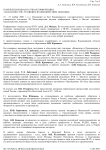
III Международная научная конференция «Запад и Восток: традиции, взаимодействие, новации»
Статья
Бесплатно

International round table “Russia and the post-Soviet space: problems and prospects” (Moscow, 2013)
Статья
The article summarizes the most significant materials of the International round table held in Moscow in April 2013: the papers by Russian and foreign experts researching the past and the present of the post-Soviet space as well as part of their discussion. The papers feature the interdisciplinary scientific analysis of different aspects of contemporary geopolitical situation in post-Soviet space. The issues discussed by the roundtable participants and the authors of the article are addressed in the context of the Eurasian and world history.
Бесплатно

On the time in Russian bylinas and its axiological nature
Статья научная
The subject matter of the given study is both the artistic time of Russian heroic epics and its relationship with the present continuous of traditional bylina narration. Based on the results of bylina axiological analysis, the author criticizes the existing stereotype (produced by M.M. Bakhtin, D.S. Likhachov, and other scholars) according to which the epic time should be described as ideal, sacral, and “insular” (an “original time”) - i.e., as separated from the ordinary time of the epic singer and his audience. According to the author, Russian folk epics do not imply any features of the sacral “original time”, but absorb traits of different historical epochs into themselves on the principle of identical “spiritual codes”, their temporality essentially open to the present and future of the epic singer and his audience. The convergence between the “ancient” epic time and the “familiar” time of the audience is due to the single system of value coordinates which, in turn, are equally applicable for the assessment of acts committed either by epic knights or listeners themselves. For this reason, the events belonging to different historical periods are rendered in Russian bylinas as subordinate to and comprehended by the universal logic of spiritual laws - the ones immanent to the consciousness of the hero and his traditional audience. The author concludes that the temporality of Russian folk epics is subjected to the law of “reverse perspective” according to which the past shouldn’t be represented as distant and vague, but, on the contrary, as realistic and near, placed in the foreground of the recipient’s perception, in the field of the present. At that, the necessary condition to “draw” the audience into the epic chronotope is the positioning of plotlines’ “vanishing point” “behind” the listener - i.e., in his or her personal space and personal time focused on individual future. As a result, the present time of the audience becomes an organic part of the epic continuum, while the “epic knights’ time” is perceived by the listener as a number of well-structured elements translating a certain axiological worldview. The transition from the “familiar” time to the «relevant epic» one is experienced by the listener precisely as a personal transition from one value system to another.
Бесплатно

Статья научная
The first decades of the13th century, on the eve of the Mongol invasion, were a difficult period in the history of Old Russia. Princely feuds and fighting for the Kievan principality led to the fragmentation and weakening of the Russian lands. Oddly enough, this period also witnessed a rise in cultural and spiritual life. That was a time of creation and intensive creative activity, the continuation of the artistic traditions of the 12th century and the emergence of qualitative changes in art. St. George’s Cathedral in Yuriev-Polsky erected in 1230-1234 is one of the most outstanding and, at the same time, the most mysterious works of architecture of the 13th century. This entire period in the history of medieval art is distinguished by a peculiar combination of types and styles from different artistic worlds. In the case of St. George’s Cathedral, it acquired a somewhat paradoxical character, enhanced by the random selection and placement of carved slabs during the restoration of its upper part which collapsed in the 15th century. The specific typological and stylistic samples that guided the customer and the executors still remain unclear. The author attempts to identify the origin of a number of motives of the Cathedral’s carved decoration, with their analogues being found both in Western and Eastern art. The artistic life of Vladimir-Suzdal Russia emerged at a crossroads of various stylistic influences. The author argues that this may explain the implementation of various themes and motives in accordance with local tastes, which form the phenomenon of the facade carving of St. George’s Cathedral - a unique monument of genuinely Russian artistic culture.
Бесплатно

Tax discrimination against the Buddhist clergy in Kalmykia (1923 - 1931)
Статья научная
This article is the first to analyze Soviet tax policy in relation to the Buddhistclergy in the Kalmyk Autonomous Region (Oblast). The study covers the peri-od of the New Economic Policy and early stages of industrialization and agri-cultural collectivization in the USSR. Unpublished documents in the NationalArchives of the Republic of Kalmykia provide the source base for this research.The author focuses attention on the decision-making and tax-collecting activi-ties of the Kalmyk Regional Financial Department and its Tax Administration.These institutions subjected Buddhist clerics in Kalmykia, whom they consid-ered enemies of socialism, to myriad direct and indirect taxes. Constant tax in-creases strained the clergy’s financial resources to the utmost. According to theauthor, fiscal policy toward the Buddhist clergy amounted to tax discrimination.Through this discrimination, regional Bolshevik Party and government officialsintended first to reduce the number of clergymen and khuruls in Kalmykia, thento eliminate them completely. By the early 1930s, excessive tax pressure led toa sharp deterioration in the financial position of the Buddhist clerics, the depar-ture of many of them from the clergy’s ranks, and the closure of most khuruls.
Бесплатно

Статья научная
The article, based on previously unknown archival materials in the NationalArchive of the Republic of Kalmykia, takes an in-depth look at the policy of theSoviet government towards Buddhism. The nature and reasons for the party-state’saccelerated “solution of the religious (Buddhist) question” in Kalmykia in 1917–1924are thoroughly analyzed. Particular attention is paid to regional authorities, who,acting on Moscow’s instructions, conducted an uncompromising struggle againstreligion. The author comes to the conclusion that the state’s policy on religion wasclearly repressive in the period under review, and did not accord with the sloganspromoted by the Bolshevik party and Soviet government. As a result, not a singlekhurul remained active in Kalmykia at the end of the 1920s. During the Soviet era, theclergy was simultaneously subjected to all manner of discriminatory persecution. Theanti-religious campaign destroyed the system that reproduced Buddhist knowledgeand its best adherents. Yet, despite strict prohibitions and persecutions, authoritarianarbitrariness and lawlessness, the Kalmyk people preserved Buddhist traditions andvalues, and subsequently survived the harshest moral and physical suffering.
Бесплатно

Статья научная
There are topics in historiography which have a peculiar destiny. Following public preferences, they may rise to the peak of attention triggering heated discussions or may fall from that height. Such was the case with the studies of the Habsburg monarchy phenomenon in the Russian intellectual tradition. The efforts to embrace it fall into several stages. The surges of acute attention were followed by its decline as the history of this state on the Danube emerged as a background for more significant developments in the Slavic lands. And then, as a response to contrastive imperial studies, interest was aroused toward holistic studies of monarchy, which brought about new discussions and conceptions. Despite its 150-year-long tradition, the Russian historiography of the Habsburg monarchy failed to shape into a separate intellectual project. It is accounted for by a number of factors coexisting for a long time, which directly influenced the historiographic situation. These are: 1) geopolitical factors; 2) Slavic factors; 3) gaps in the continuity of scientific schools and the abrupt change of paradigms in Russian historical science. Huge historiographic materials are used to analyze the turning points and crucial stages in the study of the phenomenon of the Habsburg monarchy in Russia's intellectual tradition during one and a half century.
Бесплатно

Статья научная
This article examines the attempt by local secular and religious officials to establish the size of the Old Believer population in Eastern Siberia at the beginning of the twentieth century, and the resistance the Old Believers mounted in response. The research is based on unique documents housed in several regional state archives. The authors - well-known Irkutsk historians - focus on the actions taken by local officials following the Revolution of 1905 when the autocracy found it necessary to undertake social reform to survive. As part of the religious reform, local officials attempted to introduce church registry books into Old Believer communities in 1906 in order to monitor population size and to collect data on births, marriages, and deaths. The authors thoroughly analyze the Old Believers’ reasons for rejecting the introduction of these books as part of their everyday practice. Old Believer resistance was peaceful, yet stubborn, and, as the authors show, was in keeping with the traditional Old Believer principle that accommodation with the state constituted sinful behavior. The authors clearly demonstrate that in this confrontation with state authority, the Old Believers emerged the victors.
Бесплатно

The urban self-government reform of 1785 in Siberia: legislation and bureaucratic practice
Статья научная
On the basis of archival documents discovered by the author as well as other data found in the works by Russian researchers, the article gives a detailed stage-by-stage analysis of the urban reform of 1785 implemented in the towns of Western Siberia during 1785-1870 in the provinces of Tobolsk and Tomsk. In the course of the reform the towns were for the first time granted the right to possess real estate and form their budget. The author singles out three stages in reforming urban self-government in Western Siberia, highlighting the typical features of each of them. The Siberian towns turned out unprepared for the reform in social, economic and demographic respects, argues the author. That is why the project conceived by legislators could not be fully realized at the local level. The formation of town Dumas was a slow process coming across various difficulties. As a result, it took years to complete. The reform of 1785 distinguished among six categories of citizens who had the right to elect and be elected to self- government institutions. However, the citizens falling into these categories constituted a narrow circle of merchants, urban petty bourgeois estate and artisans. Other social groups of the town population were practically not represented. As a result, the urban self-government operated largely in the interests of the merchants, and in case the latter were low-numbered, it acted in the interests of the urban petty bourgeois estate. The small-numbered nobility residing in Siberian towns had the right to be elected to the town Duma, but it did not want to burden itself with public and administrative duties. The provincial administration strictly controlled urban self-government institutions using them as an additional administrative mechanism, which rendered their activities less effective.
Бесплатно
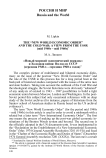
The “new world economic order” and the cold war: a view from the USSR (mid 1940's - mid 1960's)
Статья научная
The article examines the issue of the USSR’s participation / non-participation in building a new system of the world economic order after World War II with the participation of other key countries of the Western world based on the unpublished documents of two Russian archives - WUA Ministry of Foreign Affairs of the Russian Federation and RGANI. The nuances of Soviet diplomacy are discussed in detail at a conference in Bretton Woods; for the first time, the chronology of key discussions of the Soviet side is built. The author shows that the temporary refusal of the USSR to sign the Bretton Woods agreements did not mean a final refusal of economic cooperation with the West. Soviet experts discussed this topic until the beginning of 1947. The fundamentally new thesis is that in 1965 the USSR again received an invitation to take part in the Asian Development Bank, a transregional organization with global participation. However, the geopolitical situation in Southeast Asia did not allow entering through the bank into the system of the Bretton Woods institutions from the back door. The author comes to the conclusion that even without entering the official Bretton Woods institutions, the USSR influenced the world economy, influencing the Third World countries and participating in the development of the institutions of the New International Economic Order of the 1960s – 1970s, such as United Nations Conference on Trade and Development (UNCTAD).
Бесплатно

Vox populi - vox dei: elections in the Roman Republic and modern democracies (comparative analysis)
Статья научная
The article provides a comparative analysis of ancient and modern technologies for the legitimation of political power, using the example of the Roman Republic and the currently existing democracies. The focus is on the electoral procedure that unites to the utmost the direct (in ancient times) and representative (in modern times) democratic systems. In ancient Rome, in legitimating the electoral procedure the predominant role was played by religious acts, viz. two divination procedures to reveal the will of the gods (auspicia). One was held right before an election and the other during its course, ending with the annunciation of the voting result (renuntiatio). This was the key act in the procedure of electing new magistrates, without which an election was considered invalid regardless of its actual result. The procedure of announcing the voting results actually retains the ritual function of legitimation in modern democracies as well. This mission is assigned, as a rule, to representatives of the election commissions. In the modern world, the ancient Roman religious rituals have an analogy in the form of public opinion polls and political forecasts on the eve of elections which have acquired a ritual legitimizing character in modern democracies. During elections in ancient Rome, a decisive influence on the voting results was exerted by drawing of lots which determined the sequence for casting votes. Modern states, too, try to enhance their legitimation by introducing the aleatory (by lot) form of democratic procedures. Thus, the methods of legitimation of ancient and modern democracies have a certain similarity in the ritual support of the electoral process and in the preservation of the practice of choosing by lot in the electoral procedure. But the legitimating practices of modern democracy have been supplemented with the foreign policy factor, which did not exist in ancient Rome. Also, there was no powerful information pressure in the Roman Republic as there was no media. Today’s democracy is increasingly metamorphosing into mediacracy - a form of government where the interests of political actors are closely intertwined with the interests of media conglomerates.
Бесплатно
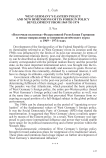
West Germany’s eastern policy and new dimensions of its foreign policy development from 1969 to 1974
Статья научная
In 1969, for the first time in the post-war history of divided Germany, the power was assumed by a different political subject than that of the CDU/CSU. The coalition of Social and Liberal Democrats, led by the Chancellor Willy Brandt, took on this challenge in the period when the West German foreign affairs policy was losing its ability to solve new problems concerning the development in Europe and in the world. It launched a difficult transformation process of changes that resulted in a more realistic approach to its new Eastern policy (Ostpolitik). As a result, West Germany gained greater global influence that enabled more space for its political manoeuvring and a better position within the Western Bloc.
Бесплатно

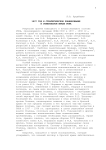

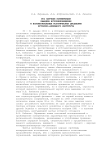
![[Рец.] За спиной колчака: документы и материалы / под ред. А. В. Квакипа. М.: Аграф, 2005. - 512 с [Рец.] За спиной колчака: документы и материалы / под ред. А. В. Квакипа. М.: Аграф, 2005. - 512 с](/file/thumb/14913313/rec-za-spinoj-kolchakadokumenty-i-materialy-pod-red-a-v-kvakipa-m.png)
